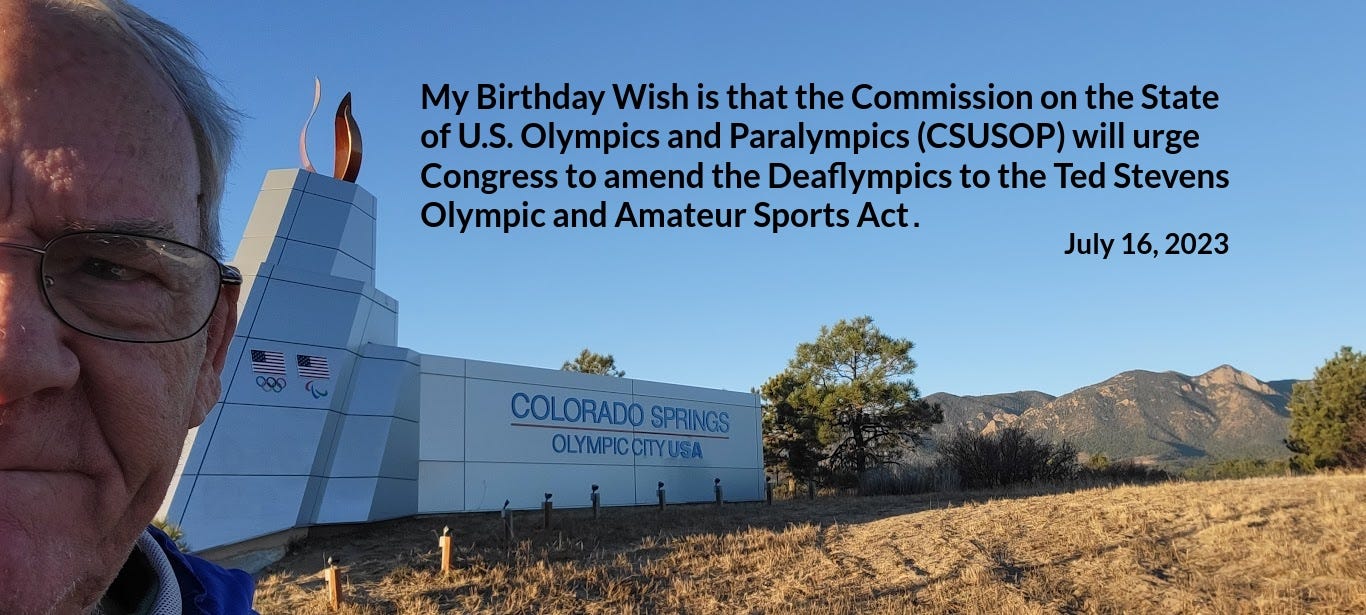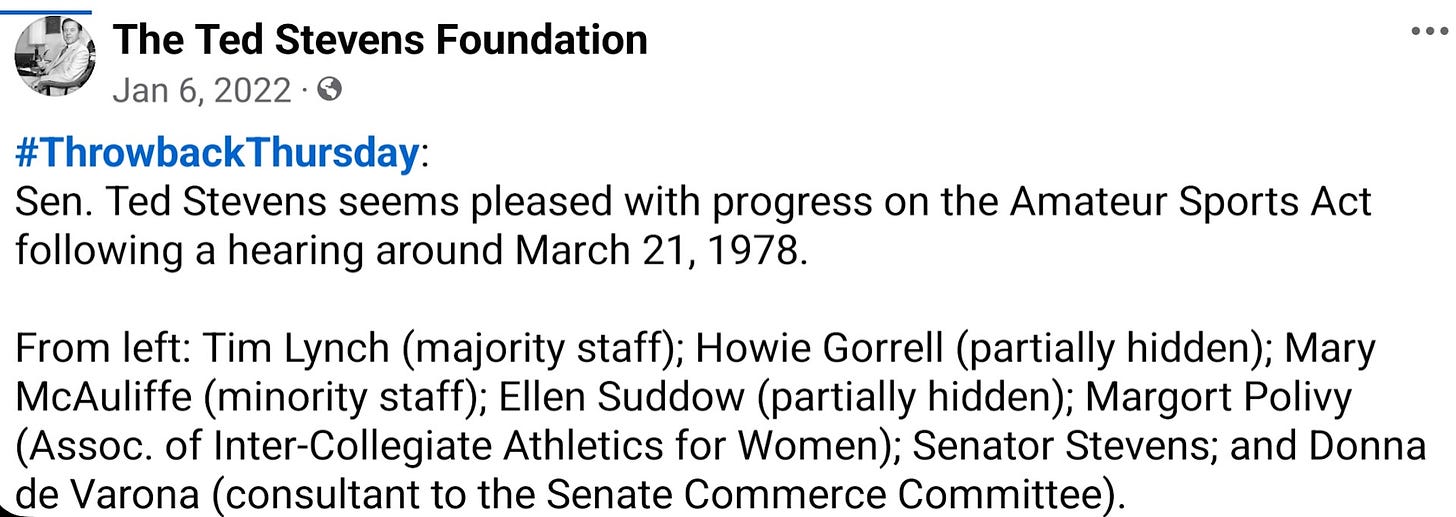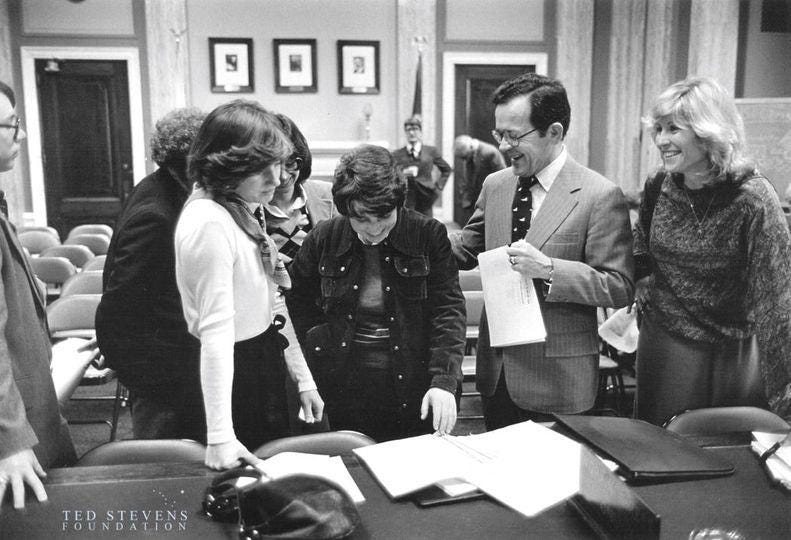United States Olympic and Paralympic Committee
That is #1 of my two 80th Birthday Wishes, although I started to wish it last year.
Chronology of my Struggle with the United States Olympic and Paralympic Committee
November 15, 1977
I unexpectedly entered the temporary office of the President's Commission on Olympic Sports (PCOS). Olympian runner Ken Moore greeted me and asked what I wanted. I explained the World Games for the Deaf (renamed the Deaflympics in 2001).
A few months later
The United States Senate Committee on Commerce, Science, and Transportation asked me to assist them in drafting the sub-sections related to athletes with handicaps in the “Amateur Sports Act” bill. There, I befriended Senator Ted Stevens.
March 21, 1978
March 29, 1978
Col. F. Don Miller, then Executive Director of the United States Olympic Committee (USOC), wrote to Richard “Dick” Caswell, Secretary-Treasurer of the American Athletic Association of the Deaf (now USA Deaf Sports Federation):
“If the Amateur Sports Act of 1978, S. 2727, is enacted, and a coordinated program of amateur sports is provided for the handicapped, and coordinated by the USOC, I would be prepared to recommend the use of Olympic terminology is association with your activities.”
July 8, 1978
The Washington Post published my Letter to the Editor, “A $12 Million Request For Athletic Facilities.”
July 12, 1978
Sen. Stevens requested the President of the U.S. Senate to insert my Letter to the Editor in the Congressional Record (page 20330) and told other Senators on the Senate floor:
“Howard Gorrell, author of the letter, is a spokesperson for the American Athletic Association of the Deaf and assisted in obtaining greater provision in the bill for the support and encouragement of programs for handicapped athletes. He is a tireless proponent of the Amateur Sports Act, because he knows what its passage can mean for American amateur athletes of all skills and ability.”
November 8, 1978
President Jimmy Carter signed the Amateur Sports Act of 1978 (ASA).
SEC. 104. The objects and purposes of the Corporation (United States Olympic Committee) shall be to—
(13) encourage and provide assistance to amateur athletic programs and competition for handicapped individuals, including, where feasible, the expansion of opportunities for meaningful participation by handicapped individuals in programs of athletic competition for able-bodied individuals;
April 28, 1979
Senator Ted Stevens spoke to the delegates at the 1979 USOC House of Delegates banquet for Gorrell's efforts in connection with the passage of the Amateur Sports Act of 1978. He said:
“Howie Gorrell has a dream. He wants to see more national governing bodies integrate handicapped athletes into their programs. He wants expanded programs for handicapped athletes. The Amateur Sports Act is going to help him achieve that dreams.”
On that date, the USOC Executive Board selected Dorothy Baker, Willie Davenport, Diane Fisher, Howard Gorrell, and LeRoy Walker as five USOC at-large members to serve on the USOC Handicapped in Sports Committee (HISC).
September 10, 1979
In his news release, the legendary USOC Director of Communication C. Robert Paul, Jr. announced the inaugural meeting of the USOC Handicapped in Sports Committee on September 1, 1979. Paul wrote the following:
“The USOC is gratified at the interest of these [five] national organizations (of the handicapped [now disabled] to join hands for the enhancement of their programs at the national and international levels.”
“F. Don Miller, USOC executive director, promised complete support for the programs under consideration by the Committee. He also predicted taht this Committee would be the catalyst in corrdinationg their sports at various levels of competition, including their own world championships.”
“Kathryn Sallade, a doctorial candidate at the University of Georgia, was chairman for the newly organized Handicapped in Sports Committee…”
Kathy Sallade [Barcroft] happens to be DEAFLYMPIAN!!! Click on her Deaflympics performance. She also coached the USA Deaf swimming team in the 1977 and 1981 Deaflympics.
Since the American Athletic Association of the Deaf was the only one which disabled individuals controlled, Kathy Sallade, Dick Caswell, and Howard Gorrell (me) helped the other four organizations, which non-disabled persons ran: National Association of Sports for Cerebral Palsy (now National Disability Sports Alliance), National Wheelchair Athletic Association, Special Olympics, and the U.S. Association for Blind Athletes.
April 20, 1980
The USOC provided an interpreter for the deaf for HISC Chair Sallade in the 1980 USOC House of Delegates meeting. At the same time as the meeting, the Public Broadcasting Service (PBS) decided to focus on the interpreter (in a circle) during Vice President Walter Mondale’s speech urging the delegates to boycott the Moscow Olympics for deaf viewers.

Late 1990’s
Disabled leaders took over from non-disabled leaders of several organizations affiliated with the Paralympic movement. They stormed the Capitol and lobbied legislators to include the Paralympics in the Amateur Sports Act.
May 22, 1998
Sen. Ted Stevens took the Senate Floor and introduced S. 2119, “Olympic and Amateur Sports Act Amendments of 1998,” which would amend the Amateur Sports Act of 1978 to strengthen provisions protecting the right of athletes to compete, recognize the Paralympics and growth of disabled sports, improve the U.S. Olympic Committee's ability to resolve certain disputes, and for other purposes.
Toward the conclusion of his introduction, Stevens exclaimed:
“World Games for the Deaf--It has been suggested that both the bill and the Committee report which eventually accompanies the bill include language in support of the World Games for Deaf and of deaf athletes. It is anticipated that this issue will be addressed by consensus before the bill becomes enacted.”
(Page at S5451 - Introductory Statement on S. 2119; Congressional Record Vol. 144, No. 67)
October 21, 1998
President Bill Clinton signed the Ted Stevens Olympic and Amateur Sports Act of 1998 (TSOASA).
May 2001
The USOC established the U.S. Paralympic Division and hired Charlie Heubner as its Director.
June 29, 2003
Bobbie Scoggins, the frustrated President of the USA Deaf Sports Federation (USADSF), told ESPN:
“I have been to USOC and disabled sports meetings, countless meetings where the Deaflympics was literally ignored, accorded only a nod as might be afforded to a stepchild. We were often isolated from the decision-making and funding process.”
July 16, 2003
The Subcommittee on Commerce, Trade, and Consumer Protection of the Committee on Energy and Commerce of the United States House of Representatives had a hearing regarding the ongoing efforts to reform the USO[P]C. Chairman Cliff Stearns (R-FL) questioned Kirk Bauer, Executive Director of Disabled Sports USA.
Mr. Stearns: Does the organization [Paralympics] you are talking about include people who cannot hear? Is that included in the disabled, hearing loss? Just yes or no.
Mr. Bauer: The Paralympic Games do not include athletes with a hearing impairment.
Mr. Stearns: But you indicated that a person with hearing loss is not part of your----
Mr. Bauer. It is part of the Olympic movement.
Mr. Stearns. But not part of your----
Mr. Bauer. The Federal legislation that established the USOC as the National Paralympic Committee deals with the Paralympics. (Note: Bauer referred to "TSOASA”)
July 18, 2007
USOC Government Relations Director Steve Bull emailed me and told me that the USOC Paralympic Division purchased an airfare for me. The following day, I packed my suitcase and flew from Washington Dulles Airport to Munich, Germany, where I resumed as Team Leader of the USA Deaf Men’s Tennis Team in the Dresse Cup for Deaf Men.
One week earlier, I needed money to pay my expenses in Germany because the USOC stopped distributing the USOC Development Funds to USADSF in 2003.
I got an idea: I would contact Sen. Stevens and ask him to contact any airline for complimentary airfare.
Instead, Stevens called Bull, who contacted Charlie Heubner. The snap worked.
Steve Bull told me, “This is a thank-you gift for what you have done for disabled athletes since 1978.”
That made me feel guilty, so I decided to seal my lips and keep my criticism of rebellious Paralympians a secret.
August 24, 2008
Lindsey Dolich (Felt), a Deaflympian soccer player and a journalist for ESPN The Magazine, said this during a 2008 interview with Deadspin (a sports blog):
“The Deaflympics has been around for almost 90 years, and it's a LEGITIMATE, global tournament with an opening ceremony, medals, and drug testing.”
September 6, 2017
In her excellent work, “The Increasing Role of Disability Issues in U.S. Sports Law,” Dionne Koller, the University of Baltimore Professor of Law Director, Center for Sport and the Law, explained that “an individual is disabled within the meaning of the Americans with Disabilities Act of 1990 if he or she has a physical or mental impairment that substantially limits one or more major life activities.” (Americans with Disabilities Act, 42 U.S.C. § 12102(1))”
NOTE: On September 21, 2021, Sen.Maria Cantwell (WA) appointed Prof. Koller to co-chair the Commission on the State of U.S. Olympics and Paralympics (CSUSOP)]
November 16, 2021
After meeting with Michelle Dusserre Farrell, Vice President of Athlete Engagement at the U.S. Olympic & Paralympic Museum in Colorado Springs, CO, two days earlier, I received an email from her, and she wrote:
“We know of and have appreciation for your decades-long advocacy for equity.”
February 8, 2023
After being greenlighted by Congress, the CSUSOP started investigating the inner workings of the U.S. Olympic structure. It made me unseal my lips and start “barking” for the equality of our forgotten Deaflympians.
Since the enactment of the TSOASA in 1998, 633 deaf athletes have had to raise funds for their expenses to the Deaflympics without getting one cent from USOPC.
You can be able to read their names by clicking the underline below:
34 athletes at the 1999 Winter Deaflympics in Davos, Switzerland
117 athletes at the 2001 Summer Deaflympics in Rome, Italy
34 athletes at the 2003 Winter Deaflympics in Sundsvail, Sweden
102 athletes at the 2005 Summer Deaflympics in Melbourne, Australia
39 athletes at the 2007 Winter Deaflympics in Salt Lake City, Utah
78 athletes at the 2009 Summer Deaflympics in Taipei, Taiwan
The 2011 Winter Deaflympics was cancelled.
59 athletes at the 2013 Summer Deaflympics in Sofia, Bulgaria
24 athletes at the 2015 Winter Deaflympics in Khanty-Mansiysk, Russia
33 athletes at the 2017 Summer Deaflympics in Samsun, Turkey
39 athletes at the 2019 Winter Deaflympics in Valtellina - Valchiavenna, Italy
74 athletes at the 2022 Summer Deaflympis in Caxias do Sul,Brazil
Unlike Olympians and Paralympians, these Deaflympians were not invited by the White House to meet the President, and the award winners did not receive prize money from the USOPC.
July 30, 2023
Donalda Ammons, Past President of the International Committee of Sports for the Deaf, wrote her public comment to the CSUSOP:
“To achieve these environments, I resolutely believe it is necessary for Congress and the USOPC to establish funding mechanisms and implement structural reforms—including revising the Ted Stevens Olympic and Amateur Sports Act to insert the Deaflympics alongside the Olympics and the Paralympics so that Deaf and Hard of Hearing Americans are better protected from abuse, mistreatment, and discrimination and are afforded equal access to the provisions of the Act as covered under the Americans with Disabilities Act.”
September 6, 2023
Jeff Mansfield, the current USADSF President, testified before the CSUSOP in a public hearing:
“I urge for the insertion of the Deaflympics into the Ted Stevens Olympic and Amateur Sports Act and to USOPC’s mandate and for the investment in Deaflympians. As Deaflympians, we are proud to wear the letters “U.S.A.” across our chests, and today we are calling on our country to have our backs. Nothing about us without us.”
March 1, 2024
The CSUSOP released the Final Report for Congress. Shockingly, the Commissioners decided not to recommend Congress to amend the Inclusion of the Deaflympics, but the CSUSOP recommended two different ones:
Congress should further study the issue of integrating deaf and hard-of-hearing athletes and deaf sports into the U.S. Olympic and Paralympic movement.
USOPC and USADSF work together, in coordination with the U.S. Patent and Trademark Office, to ensure that USADSF can make use in the United States of trademarked words and phrases that the IOC has granted to Deaflympics internationally and that USADSF can enter into sponsorships without hindrance from USOPC.
July 5, 2024
As a devoted Amerideaf’s Newsletter reader and an Athlete Advocate, Allison Belikoff texted me:
“Hi! I have been reading as much as I can about the exclusion of hard-of-hearing and deaf athletes under the USOPC.
It is incredibly baffling to me that you were a vital part of the ASA only to be left out...”
[Note: Among the ASA working group, I am the second oldest surviving member (80), while Michael “Mike” Harrigan is the oldest one (82) - see Part 2.]
July 10, 2024
As I did on November 15, 1977, I walked unexpectedly into the regional office of U.S. Senator Joe Manchin (WV) in Fairmont, West Virginia. I delivered the Deaflympians’ rat-infested 26-year-long written proposal to that Senator’s front desk.
Today
As of this writing, no congressional action has been taken regarding the CSUSOP recommendations above.
Today, 46 years and eight months have passed since I first contacted PCOS in November 1977.
Howard “Howie” Gorrell attended 13 of the last 14 Deaflympics since 1969 and is a 2004 recipient of the USADSF Jerald M.Jordan Award, given to those who exhibit leadership and continuous participation toward the goals of the Deaflympics and the 2011 Art Kruger Award for demonstrating leadership and constant participation,support and contribution in the USADSF over an extended period.






